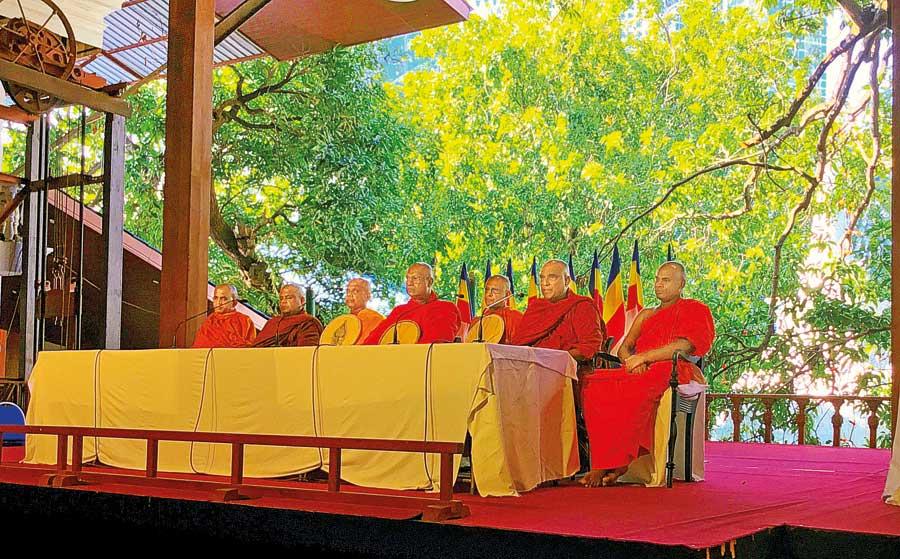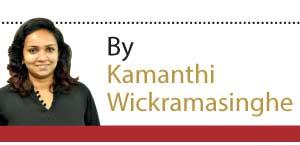24 Jan 2024 - {{hitsCtrl.values.hits}}

Media briefing presided over by Chief Incumbent of the Gangaramaya Temple, Ven. Dr. Kirinde Assaji Thera, Chief Sanganayakas and Chief Incumbents from respective countries.
Sri Lanka will be the host country for the Annual Assembly of the Sri Lanka Bhikkhu Association in Europe, scheduled to be held on January 29, at the BMICH. The assembly will be held for the first time in Sri Lanka, under the auspices of over 50 Buddhist Theros from around the world. Inaugurated in Vienna in May 2023, its first assembly witnessed the participation of Buddhist Theros from Austria, Bangladesh, Cyprus, Denmark, France, Japan, Italy, Malaysia, Norway, Sweden, Switzerland and Sri Lanka. The Sri Lanka Bhikkhu Association in Europe was established with a vision to propagate Buddhism in Europe.
The assembly will be held for the first time in Sri Lanka, under the auspices of over 50 Buddhist Theros from around the world. Inaugurated in Vienna in May 2023, its first assembly witnessed the participation of Buddhist Theros from Austria, Bangladesh, Cyprus, Denmark, France, Japan, Italy, Malaysia, Norway, Sweden, Switzerland and Sri Lanka. The Sri Lanka Bhikkhu Association in Europe was established with a vision to propagate Buddhism in Europe.
The media briefing to announce the event was held in the presence of several esteemed Buddhist monks in Sri Lanka and overseas, including Chief Incumbent of the Gangaramaya Temple, Ven. Dr. Kirinde Assaji Thero, Chief Sanganayaka of Europe, Chief Incumbent of the Dhamma-Zentrum Nyanaponika in Austria and President of the Sri Lanka Bhikkhu Association in Europe, Ven. Dr. Wijayarajapura Seelawansa Thero, Adhikarana Sanganayaka in Germany, Ven. Dr. Ratmale Punnarathana Thero, Europe’s Chief Sanganayaka and Chief Incumbent of the Samadhi Vihara in Sweden, Ven. Dr. Udugama Narada Thero, and Italy’s Chief Sanganayaka and Chief Incumbent of Sicily Buddhist Vihara, Ven. Dr. Wageegoda Seelananda Thero.
Inaugurated in Vienna in May 2023, the first assembly witnessed the participation of Buddhist Theros from Austria, Bangladesh, Cyprus, Denmark, France, Japan, Italy, Malaysia, Norway, Sweden, Switzerland and Sri Lanka. The Sri Lanka Bhikkhu Association in Europe was established with a vision to propagate Buddhism in Europe.
“Buddhism became a widespread religion in the rest of the world during the same time it was introduced and established in Sri Lanka,” said Ven. Dr. Kirinde Assaji Thero. “One of the reasons is that Sri Lanka has taken a centre stage in not only studying about Theravada Buddhism but also spreading the word of the Dhamma to the rest of the world. The Sri Lankan bhikkhu has closely studied Buddhism, Pali and Sanskrit and is ready to carry this message forward. While carrying out religious awareness programmes, Sri Lankan bhikkhus play a pivotal role in safeguarding the culture, language and identity of the country. They have been educating people in their respective countries, by conducting Dhamma schools for children, and thereby familiarizing them with the language and culture of Sri Lanka, while making them aware of the Dhamma. In this way, people in other countries can improve their knowledge on Buddhism and the Dhamma, and develop a clear image about Sri Lanka.”
The Thero further noted that Sri Lankan bhikkhus face many hardships while living in other countries. “When Sri Lankan bhikkhus leave the country, they have to do everything by themselves; they have to be independent on their own, get citizenship, find a place to construct a temple, gather the Buddhist population in their countries and continue their services there. In fact we have to appreciate them for these sacrifices. We, Sri Lankans, may think that a bhikkhu in Europe would be spending a luxury life. But on the contrary, they have to brave the weather, pay taxes to respective governments, gather the trustees on weekends and engage them in religious activities, and travel long distances to serve their needs.
Bhikkhus render a more important diplomatic service than most diplomatic missions. They go to the grassroots levels, inquire about the needs and wants of people, and address sensitive issues in a matured manner. Religion goes beyond one’s ethnicity. When the West had mixed reactions about Sri Lanka at the height of the ethnic conflict and various other issues, Sri Lankan bhikkhus still carried out their duties.
Bhikkhus render a more important diplomatic service than most diplomatic missions. They go to the grassroots levels, inquire about the needs and wants of people, and address sensitive issues in a matured manner. Religion goes beyond one’s ethnicity. When the West had mixed reactions about Sri Lanka at the height of the ethnic conflict and various other issues, Sri Lankan bhikkhus still carried out their duties. Even though their roles haven’t been highlighted for decades, they have continued their services to date. Many Chief Incumbents in respective countries carried out their duties to the point that they didn’t have a chance to visit their homeland even during the final stages of their lives. With lessons from the past, this assembly provides us with an opportunity to gather physically and virtually with technological advances, thereby strengthening these relationships further.”
The main objective of this conference is to engage in religious awareness activities and for Sri Lankan bhikkhus based overseas to get together in association with the Chief Prelates of the three chapters and highlight the work that they have been doing and what they intend to do in their respective countries, for ambassadors and diplomats to acknowledge and create an environment to familiarize themselves with the Sri Lankan people. “Over 59 Chief Incumbents from over 50 temples are part of this association, and through this conference, the bhikkhus will be able to improve philanthropic activities they have been performing in rural parts of the country, such as providing scholarships for underprivileged children. This will further strengthen diplomatic relations between Sri Lanka and the respective countries. We are proud that these Sri Lankan bhikkhus have reached greater heights in their respective countries, and appreciate the fact that they visited Sri Lanka to extend their support to their homeland,” The Thero said in conclusion.
28 Apr 2024 3 hours ago
28 Apr 2024 5 hours ago
28 Apr 2024 5 hours ago
28 Apr 2024 6 hours ago
28 Apr 2024 8 hours ago